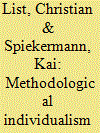| Srl | Item |
| 1 |
ID:
127822


|
|
|
|
|
| Publication |
2013.
|
| Summary/Abstract |
Political science is divided between methodological individualists, who seek to explain political phenomena by reference to individuals and their interactions, and holists (or nonreductionists), who consider some higher-level social entities or properties such as states, institutions, or cultures ontologically or causally significant. We propose a reconciliation between these two perspectives, building on related work in philosophy. After laying out a taxonomy of different variants of each view, we observe that (i) although political phenomena result from underlying individual attitudes and behavior, individual-level descriptions do not always capture all explanatorily salient properties, and (ii) nonreductionistic explanations are mandated when social regularities are robust to changes in their individual-level realization. We characterize the dividing line between phenomena requiring nonreductionistic explanation and phenomena permitting individualistic explanation and give examples from the study of ethnic conflicts, social-network theory, and international-relations theory.
|
|
|
|
|
|
|
|
|
|
|
|
|
|
|
|
| 2 |
ID:
160565


|
|
|
|
|
| Summary/Abstract |
Why is there no reactionary international theory? International relations has long drawn on a range of traditions in political thought. However, no current, or even recent, major school of international-relations theory embraces reactionary doctrine. This is more surprising than some might assume. Reaction was once common in the field and is now increasingly common in world politics. In this note, we define reaction and show that no active and influential school of international-relations theory falls within its ideological domain. Nonetheless, reactionary ideas once deeply shaped the field. We identify two distinct kinds of reactionary international politics and illustrate them empirically. We argue that the current lack of reactionary international relations undermines the field's ability to make sense both of its own history and of reactionary practice. Finally, we offer some preliminary thoughts about why reactionary ideas hold little sway in contemporary international-relations theory.
|
|
|
|
|
|
|
|
|
|
|
|
|
|
|
|